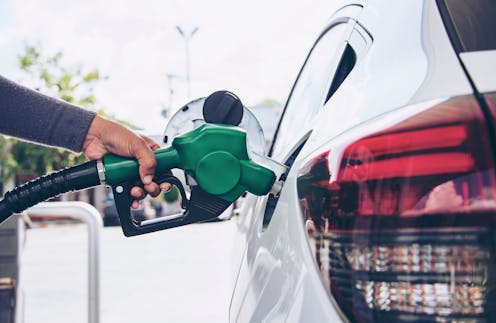5 tips to make your fuel tank last longer while prices are high
- Written by Robin Smit, Adjunct Associate Professor, University of Technology Sydney

The federal government’s announcement of a halved fuel excise is no doubt music to many people’s ears. Following Tuesday night’s budget release, the excise (a government tax included in the purchase price of fuel) was halved[1] from 44.2 cents per litre to 22.1 cents.
Read more: What is petrol excise, and why does Australia have it anyway?[2]
It should provide some respite from high petrol and diesel prices driven by[3] Russia’s war on Ukraine.
However, the cut is only expected to last six months. And Treasurer Josh Frydenberg has said[4] it will take up to two weeks before fuel prices get cheaper (and potentially longer in regional areas).
The costs
Assuming it costs A$2 per litre for petrol and diesel fuel, and an average fuel consumption of about 11 litres per 100 kilometres[5] driven – driving a typical fossil-fueled passenger vehicle right now would cost about 20 to 25 cents per kilometre.
You’re probably quite happy if you own an electric vehicle. With a real-world electricity consumption[6] of 0.15 to 0.21 kWh per kilometre and electricity costs[7] of about 20 to 30 cents per kWh, your cost of driving per kilometre is about 3 to 6 cents. And if you can charge your vehicle’s battery for free with home solar panels, your cost per kilometre is $0.
But for those of us who don’t own an electric vehicle, making the best use of our fuel tanks will be a priority. Here are some ways you can make your vehicle go the extra mile.
1. Use a smaller, lighter car
There are a number of things you can do to reduce your fuel use. The obvious one is to not use your car, but walk or grab your bicycle, if possible.
Read more: Thinking of swerving high fuel prices with an e-scooter or e-bike? 5 crucial questions answered[8]
If you do have to drive, try to minimise your total travel distance. One way would be to combine a number of errands into your journey and optimise your route.
The specific vehicle you use also matters. As a general rule of thumb, the larger and heavier your car[9], the more energy and fuel it will require per kilometre. Choosing a smaller car, rather than a large SUV, will definitely reduce your fuel bill. A large SUV will use almost twice as much fuel per kilometre as a small car.
Research[10] also suggests that for every 100kg increase in vehicle weight, fuel consumption increases by about 5% to 7% for a medium-sized car. So in addition to driving a smaller car, it’s best to reduce your load and avoid driving around with extra weight.
2. Use eco-driving techniques
The way you drive is important too. Eco-driving involves being conscious of your fuel consumption and taking actions to reduce it. There are various ways to do this.
Every time you brake and stop, you have to accelerate again to reach your desired speed. Acceleration uses a lot of energy and fuel, so driving smoothly, anticipating traffic and preventing stops will lead to savings on your fuel bill.
What you want to do is flow with the traffic and keep your distance from other vehicles. It also helps to keep an eye further up the road, so you can avoid obstacles and therefore unnecessary braking and acceleration.
If you’re in the minority of people who own a manual vehicle, drive in the highest gear possible to reduce engine load and fuel use. And if you’re in an automatic vehicle, use the “eco” setting if you have one.
3. Give your engine and climate a break
Another simple tip is stop unnecessary idling with the engine still engaged. A small car typically uses one litre of fuel per hour while idling, whereas this is close to two litres per hour[11] for a large SUV.
Of course, we idle regularly while waiting in traffic and generally can’t do much about that, other than trying to drive outside peak hours when roads are less congested. In other cases, we can change things. For instance, idling when a vehicle is parked will use up fuel unnecessarily.
4. Turn off the AC
Most people may not realise this, but using your air conditioner can use up quite a bit of extra fuel: somewhere between 4% and 8% of total fuel use. Using the fan instead will require less energy than air conditioning. Or even better, wind down the windows for a bit for fresh air when you are driving in the city.
5. Tend to your tires and consider aerodynamics
It also pays to keep your tires inflated[12], which can save you between 2% and 4% in fuel use.
Also, your car is designed to be aerodynamically efficient. Anything that changes that, including roof racks, bull bars and bike racks, will come with an additional fuel penalty – particularly at higher speeds, such as on the freeway.
References
- ^ halved (www.smh.com.au)
- ^ What is petrol excise, and why does Australia have it anyway? (theconversation.com)
- ^ driven by (theconversation.com)
- ^ has said (www.abc.net.au)
- ^ 11 litres per 100 kilometres (www.abs.gov.au)
- ^ real-world electricity consumption (mdpi-res.com)
- ^ electricity costs (www.canstarblue.com.au)
- ^ Thinking of swerving high fuel prices with an e-scooter or e-bike? 5 crucial questions answered (theconversation.com)
- ^ the larger and heavier your car (www.transport-e-research.com)
- ^ Research (www.sciencedirect.com)
- ^ two litres per hour (www.transport-e-research.com)
- ^ tires inflated (www.racq.com.au)
Read more https://theconversation.com/5-tips-to-make-your-fuel-tank-last-longer-while-prices-are-high-180134
















